53 Cool Baby Names That Mean Ice Or Snow
If you’re trying to come up with a name for a winter baby, you should consider names that mean ice or snow. Cold weather can be difficult to deal with at times, but there’s nothing more beautiful than a calm winter day when the snow is falling peacefully.
Snowflakes are mesmerizing and remarkably unique. No matter how many of them fall from the sky, there are never two that are exactly the same. Just like how your child will be special and have their own unique characteristics.
Mental Floss has some really cool facts about ice. In many ways, life on Earth as we know it depends on ice. It provides most of the world’s fresh water supply, keeps global sea levels from rising disastrously, and gives us vital data about past and future climates. Did you know there is such a thing as an ice volcano?
Let’s get to it! In this post, we’ve put together a list of 53 wintry baby names for you to search through.
Winter Boy Names That Mean Ice
Including (origins) and “meanings”
The names on this list were researched using websites like BabyCenter to find their origins and meanings, just remember that certain names have several meanings in other languages.
Aisi (Polynesian) “ice”
Names have special meanings in Polynesian culture. Ice represents purity, clarity, and strength and symbolizes the power of nature and its ability to transform. The name Aisi is chosen to honor these qualities and connect to Polynesian heritage.
Isbert (German) “bright ice”
In German, "is" refers to "ice" and "bert" means "bright" or "shining." When combined, the name Isbert creates an image of ice that sparkles or shines brightly.
Isbrand (German) “ice sword”
In German, "is" refers to "ice" and "brand" signifies "sword." When combined, the name Isbrand creates an image of a sword made of ice.
Isfrid (Nordic) “beautiful ice”
In the Nordic language, "is" refers to "ice" and "frid" means "beautiful" or "peaceful." When combined, the name Isfrid creates a picture of ice that is considered beautiful.
Isolde (German) “ice battle”
The name Isolde has different interpretations and origins. While it is commonly associated with the meaning "beautiful" or "fair," family tradition connects it to the name Isolde, the wife of Tristram from Arthurian legends.
There is also a suggestion that it may come from the Old German word "ishild," meaning "ice battle."
Izotz (Basque) “ice”
In Basque language and culture, Izotz represents ice. The name Izotz can evoke a sense of coolness and purity.
Jaki (Nordic) “iceberg”
In Nordic culture, icebergs are large and beautiful masses of ice found in the sea. The name Jaki represents the power of these icy formations.
Jokull (Icelandic) “glacier; ice”
In Icelandic, Jokull refers to the majestic and icy formations found in glaciers and reflects the beauty and strength associated with them.
Tushar (Indian) “ice; snow; cold”
In Indian culture, Tushar represents the chilly and serene qualities of ice and snow. It reflects their coolness and purity. People may choose the name Tushar for different reasons, such as liking nature or having a connection to Indian heritage.
Snow Names For Boys
Andri (Old Norse) “snowshoe”
In Old Norse, Andri refers to a type of footwear used to walk on snow. It represents the practicality and adaptability needed in snowy environments. The name Andri reflects the connection to winter and snowy conditions.
Edur (Basque) “snow”
In Basque culture, Edur represents the pure and peaceful qualities of snow and the beauty and calmness of snowy landscapes.
Eirwan (Welsh) “white snow”
In Welsh, Eirwan combines the words "eira" meaning "snow" and "gwen" meaning "white." Eirwan represents the beauty and purity of snowy landscapes.
Fannar (Icelandic) “snowdrift”
In Icelandic, Fannar represents the accumulation of snow formed by the wind. It symbolizes the unique formations created by nature and reflects the beauty and distinctivenes of snowdrifts.
Haukea (Hawaiian) “white snow”
In Hawaiian, Haukea combines the words "hau" meaning "snow" and "kea" meaning "white." It represents the purity and whiteness of snow and reflects the beauty and tranquility associated with snowy landscapes.
Himaanshu (Indian) “cool like snow”
In Indian culture, Himaanshu combines the words "hima" meaning "snow" and "anshu" meaning "cool." It reflects the calming qualities that snow brings and represents the coolness and peacefulness found in snowy landscapes.
Nas (Native American) “snow”
In Native American culture, Nas symbolizes the beauty of snowy landscapes. People may choose the name Nas because they appreciate nature or have a connection to Native American heritage.
Nevin (Irish) “snow”
In Irish culture, Nevin represents the pure and gentle snow that blankets the land during winter. It symbolizes the tranquil beauty and serenity of snowy landscapes.
Pyry (Finnish) “snowstorm”
In Finnish, the name Pyry represents the strong and swirling snowfall during a storm. It symbolizes the energetic nature of snowy weather. The name Pyry reflects the intense and exciting qualities of a snowstorm.
Sionnach (Irish) “snow fox”
The name Sionnach represents the fox's connection to winter and the snowy landscapes. It reflects the cunning and adaptability of the fox in snowy environments.
Tivar (Norse) “snowshoe”
In Norse culture, Tivar represents the special shoes people used to walk on snow. It shows how they could adapt and survive in snowy conditions. The name Tivar reflects the cleverness and strength that come with using snowshoes.
Wintan (Old English) “winter’s friend”
The name Wintan shows a close and positive connection to the winter season. It reflects the idea of enjoying and embracing winter.
People may choose the name Wintan because they appreciate the beauty of winter or have a connection to Old English heritage.
Yas (Native American) “snow”
Snow is known for its purity and how it covers the landscape in a beautiful way. The name Yas reflects a connection to nature and the peaceful qualities of snow.
Yukio (Japanese) “snow boy”
The name Yukio represents the connection to snowy landscapes and the youthful spirit. Yukio reflects the charm and innocence of a boy in relation to snow.
Zane (American) “white as snow” - Zane is a 4 letter boy name that is also on our short boy name list
Zane represents the pure and pristine whiteness associated with snow. It reflects the beauty and simplicity of the color white.
Girl Ice Names
Crystal (Greek, English) “ice”
The name Crystal comes from the ancient Greek term "krustallos," which means "ice" or "frozen." Crystals can be found in nature, like quartz and diamond, or they can be made by people.
They are known for being clear and having interesting ways of interacting with light. When light shines on a crystal, it can create beautiful reflections and refractions.
Ísey (Icelandic) “ice island”
The name Ísey combines the Icelandic words "ís" meaning "ice" and "ey" meaning "island." Therefore, Ísey can be seen as a name that brings to mind the image of an icy island.
Isolde (Welsh) “ice ruler”
The name Isolde is thought to mean "ice ruler" because of its history and the words it comes from. In the legend of Tristan and Isolde, the name has Celtic roots and is associated with a romantic story.
The meaning comes from combining "is" which means "ice" and "hild" which means "ruler" in an old German language. However, it's important to note that the name is mostly known for its connection to the romantic tale, rather than its literal meaning.
Khione (Greek) “goddess of ice and snow”
In Greek mythology, Khione means "goddess of ice and snow". In the stories, Khione is a goddess associated with winter and represents the personification of snow.
Her name comes from the Greek word for "snow." She is not as famous as other Greek gods and goddesses but symbolizes the cold and beauty of winter in ancient Greek tales.
Kori (Greek) “ice”
In Greek, the name Kori signifies the frozen state of water or icy conditions. Although it is a straightforward name with a simple meaning, it doesn't have any special stories or legends associated with it in Greek culture.
Nilak (Greenlandic) “a piece of freshwater ice”
In Greenlandic culture, where ice and snow play a significant role, Nilak refers specifically to a small chunk or portion of freshwater ice.
It carries a connection to the icy landscapes and the importance of ice in the local environment. It is a unique and meaningful name derived from the natural elements found in Greenland.
Snow (English) “frozen rain”
In English, the term "snow" refers to the white, frozen precipitation that falls from the sky during cold weather conditions. It can be used as a simple and descriptive name that captures the essence of this wintry weather.
Winter Snow Names For Girls
Aneira (Welsh) “much snow”
In Welsh, Aneira combines "ane" meaning "much" and "eira" meaning "snow." The name symbolizes a significant amount of snow, possibly representing a connection to wintry landscapes or an appreciation for the beauty of snowfall.
Berfin (Turkish, Kurdish) “snow”
The name Berfin comes from Turkish and Kurdish and means "snow." In both languages, Berfin represents the beauty and peacefulness of snow. It is a straightforward name that reflects the snowy landscapes and the purity of snow.
Bora (Albanian) “snow”
Bora represents the beauty and tranquility of snow-covered landscapes. It is a simple and meaningful name derived from the Albanian language, emphasizing the connection to the wintry and snowy elements.
Borime (Albanian) “powdery snow”
The name Borime as means "powdery snow" in Albanian. This interpretation highlights a specific type or texture of snow, emphasizing its fine and light quality.
Chione (Greek) “snow”
In Greek mythology, Chione was the daughter of Boreas, the North Wind, and she was often depicted as a nymph or goddess of snow.
Drifa (Norse) “snowfall”
In Norse mythology, Drifa is connected to the idea of snow falling from the sky. It brings to mind the image of soft snowflakes gently coming down and covering the ground.
Edurne (Basque) “snow”
In Basque, "edur" refers to snow, and the suffix "-ne" is a common feminine ending. Therefore, the name "Edurne" represents the wintry element of snow.
Eirwen (Welsh) “white as snow” - Eirwan is also on our list of aesthetic baby names
In Welsh, "eira" means "snow" and "wen" means "white." Combined, they create the imagery of something as pure and pristine as freshly fallen snow.
Fjolla (Albanian) “snowflake”
In Albanian, the name Fjolla specifically refers to the delicate and unique ice crystals that form when snow falls. It represents the individuality and fragility of each snowflake.
Gwyneira (Welsh) “blessed snow”
Gwyneira combines "gwyn" meaning "white" or "blessed" and "eira" meaning "snow." Therefore, "Gwyneira" can be interpreted as meaning "blessed snow" or "white snow" in Welsh.
It is a poetic and enchanting name that captures the beauty and purity of snowfall.
Havaska (Hungarian) “snowy”
Havaska means "snowy" in Hungarian. This interpretation emphasizes the association with snow or wintry conditions.
Hima (Indian) “snow; winter”
The name Hima represents the beauty and coldness of winter landscapes. In Indian culture, it is sometimes associated with the goddess of snow or winter. Hima is a peaceful and pure name that celebrates the snowy elements of nature.
Kari (Turkish) “covered with snow”
In Turkish, the name Kari signifies something being adorned or coated with snow. It reflects the wintry landscapes and the beauty of snow-covered environments.
Lixue (Chinese) “beautiful snow”
In Chinese, "li" means "beautiful" and "xue" means "snow." When combined, they symbolize the captivating beauty of snow. Lixue is a graceful and enchanting name that conveys the elegance and purity of snow in Chinese culture.
Lumi (Finnish) “snow”
In Finnish, the name Lumi specifically refers to the cold, white precipitation that falls during the winter season. It symbolizes the beauty and purity of snow, often associated with the pristine landscapes of Finland.
Miyuki (Japanese) “beautiful snow”
The name Miyuki represents the beauty and charm of snow. In Japanese culture, snow is admired for its delicate and attractive qualities. Miyuki is a graceful name that brings to mind serene winter scenes and the loveliness of snowflakes.
Nevada (Spanish) “covered in snow” - Nevada could also be a destination name for girls
In Spanish, the name Nevada refers to the act of snowfall or a snowy event. It symbolizes the presence of snow covering the surroundings
Neve (Latin) “snow”
Neve represents the cold and delicate precipitation that falls during winter. It is a simple and elegant name that captures the essence of snow and its association with purity and tranquility.
Nieva (Spanish) “snows”
The name Nieva signifies the action of snowfall or the presence of snow. It is a descriptive name that evokes the imagery of falling snow and wintery landscapes.
Nieves (Spanish) “our lady of the snows”
Nieves is inspired by the title "Nuestra Señora de las Nieves" associated with the Virgin Mary. The name honors Mary's connection to snowy regions and significant snowfall events.
RELATED: Biblical Girl Names
Olwen (Welsh) “snowy footprint”
In Welsh mythology, Olwen is a character associated with beauty and purity. The name is formed by combining "ol" meaning "footprint" and "wen" meaning "white" or "pure." It symbolizes the pristine mark left behind by walking on snow.
Piren (Mapuche) “snow”
Piren is a name of Mapuche origin that signifies "snow" in their language. It represents the beauty and significance of snow in the natural environment of the Mapuche people's ancestral lands.
Looking for more names? Try our complete list of weather baby names, or explore our individual lists of baby names that mean rain, names that mean air, wind, or sky, or names that mean lightning, storm, or thunder.
Here are more baby name posts to consider:
NAME LISTS FOR BOYS AND GIRLS
BOY NAMES LISTS
We’d love to hear if you have any favorite baby names from our list. Or maybe you’ve got a name suggestion that you’d like added?
Either way, leave a comment and let us know!





